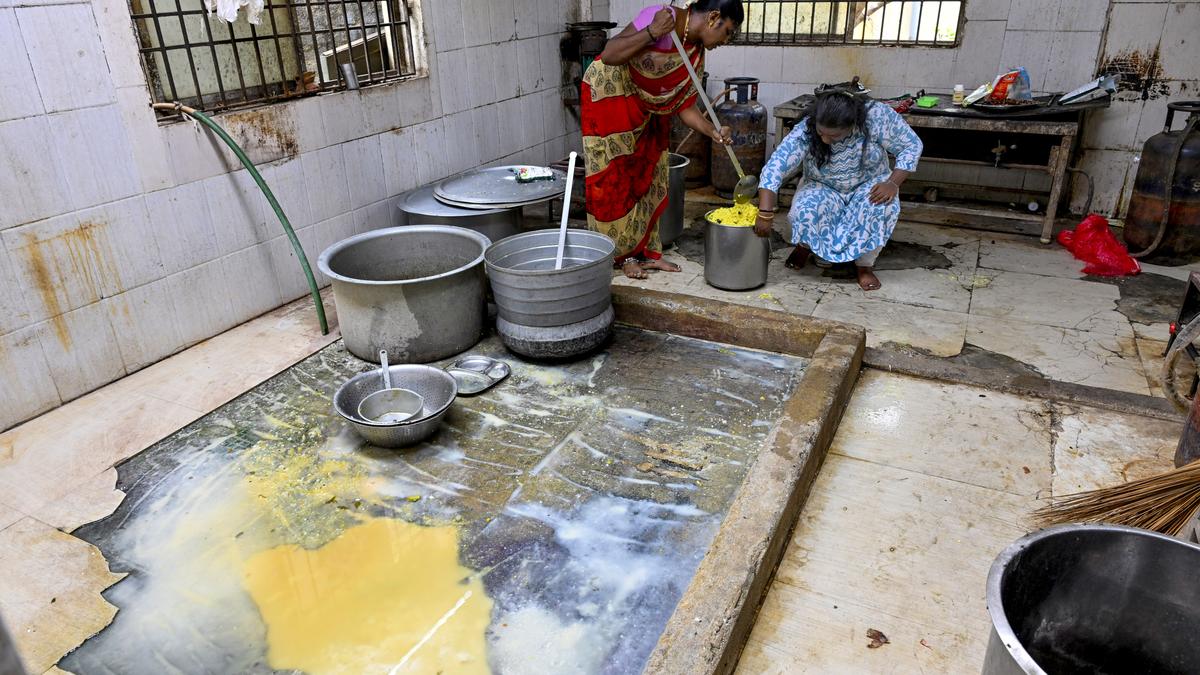
Everyone loves a hot, cheap meal
The Hindu
Amma Canteens in Tamil Nadu struggle with declining quality and maintenance, yet remain vital for affordable meals.
Over a decade after the Tamil Nadu government opened Amma Canteens to improve food security for people of the State, the outlets are still operational, though signs of distress are visible everywhere. In terms of government support and clientele, not to mention the quality of food, they are a pale shadow of what they were.
Launched on February 24, 2013, on the birthday of then Chief Minister Jayalalithaa, Amma Canteens (or Unavagams) initially opened in Chennai. Soon, they were expanded to different towns and cities. In the city, the number grew to 407. The municipalities and the corporations ran the canteens, subsidised heavily with the provisions offered by the Civil Supplies Department. The target was to operate 1,000 outlets. Idlis and pongal for the breakfast, with piping hot sambar and chutney, and sambar rice and curd rice for lunch — all priced under ₹5 — were made available to daily-wage workers, students rushing to schools, people of itinerant communities, those leaving for work early in the morning, and even software employees living away from their home towns.
V. Vasudevan, an autorickshaw driver in Chennai, captures the present through the prism of the past: “On a busy day, stopping by any Amma Unavagam in the city would be the healthiest break for many. But, these days, many canteens are closed and some do not operate regularly. Earlier, side dishes were practically unlimited, but now they are restricted at certain Amma Unavagams.”
The State government operates Amma Canteens in several districts. Chennai leads with 399 canteens, followed by Salem, 15; Tiruchi, 14; Madurai, 12; Coimbatore, 10; Tiruppur and Tirunelveli, 10 each; and Thoothukudi, 8. Around Chennai, there are two canteens each at Tambaram, Pallavaram, Maramalai Nagar, and Kancheepuram and one each at Chengalpattu, Anakaputhur, Pammal, Madurantakam, and Sembakkam. Before the bifurcation of Vellore district that included the present-day Ranipet and Tirupattur districts, 11 canteens were opened by Jayalalithaa in 2015. Cheyyar, Arani, Vandavasi, Tirupattur, Jolarpettai, Vaniyambadi, Ambur, Gudiyatham, Peranampattu, Ranipet, Walajapet, Arakkonam, Melvisharam, and Arcot have one canteen each. This is not a comprehensive figure: the status of many canteens remains unknown.
These days, pongal and idlis are served for breakfast. For lunch, tomato rice, curry leaf rice, and lemon rice, apart from curd rice and sambar rice, are served. Dinner options include chapathi and dal. The prices have been the same since 2013: idli is priced at ₹1 apiece, two chapathis are priced at ₹3 with side dish, curd rice with pickle at ₹3 per serving, and other rice varieties at ₹5 per serving. These canteens also came to the rescue of people during the floods in 2015 and 2023 and during the COVID-19 lockdown, when they provided free food to those who were stranded.
In Chennai, 399 canteens have been functioning since 2022. Deputy Mayor M. Magesh Kumaar says some outlets in remote areas had to be closed because of low footfall. It may be recalled that after coming to power, the DMK said it would not disrupt the functioning of these canteens. In 2020, the then Chief Minister, Edappadi K. Palaniswami, launched three Amma Canteens on wheels in Chennai. Each vehicle cost ₹5.6 lakh. The status of these vehicles is also unknown. However, a councillor says the issue will be discussed at the next meeting of the Greater Chennai Corporation (GCC) Council.
Initially, the government hit upon the much-lauded strategy of tasking women’s self-help groups with running these canteens. Cost-cutting, downsizing, poor building infrastructure, reduction in supplies, and lack of salary increases have been the complaints of the workers over the years. AIADMK organisation secretary and former Minister D. Jayakumar says he has received complaints about the decline in food quality at these canteens, and the government must address the issues.











